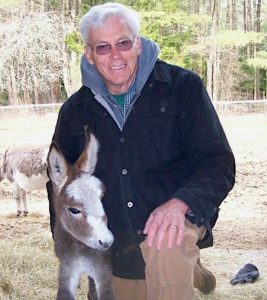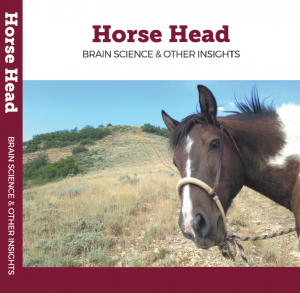This week, we hear from Dr. David Jefferson, who read Horse Head: Brain Science & Other Insights. Jefferson is the author of the recently published, Goodbye, Old Friend: The Euthanasia of Your Horse. We reviewed it here.
Jefferson writes:

Dr. David Jefferson
Saddle up! This book is a wild ride! It will take you not only into the working of what goes on inside the horse skull, but way down in his feet, with several stops in-between. I spent four years in vet school and more than 50 years in practice, but still learned a bunch from this book.
The early chapters are full of the science and chemistry of the horse brain. Maddy Butcher also explains the unique nature of equine anatomy and why it is such a strong influence on how they act and react. I remember bushwhacking on a mule and getting totally disoriented deep in the Maine woods. My own attempts to get us back made it worse. In a bit of a panic, I finally had the sense to give Jerome his head. He did a 180 and easily got us home. It was always a mystery to me how he did it until I read the section about place and grid cells in the equine brain. Just another thing left out of the curriculum in vet school.
The author’s remarks on the evolution of training horses in the US are well-written and enlightening.
My favorite section is Chapter 7 where Maddy gives us some good solid horse care truths that are spoken through her “beloved burro”, Wise Ass Wallace. Sounds hokey, but it works. Hearing from WAW in this section alone is worth the price of the book.
If you want to dig a little deeper into the history, art, and science of training horses, this book will round out your education. At the end of an equine experience day, this book belongs next to the chair you read in, not tucked away in your bookcase. Refer to it often. It is filled with unique ideas and a lot of solid horse wisdom.
Signed,
David A Jefferson, DVM
We also heard from Mike in Virginia, who had this to say about Horse Head:
Extraordinarily thoughtful and thought-provoking. Your essays present a perfect distillation of language and concept. Your meaning and message are simultaneously specific and transcendent.
When I think you say the horse/human relationship can/could/should serve as a measure of an individual’s, a community’s, a culture’s “essence,” I am especially pleased. Wendell Berry’s essays, to my mind, seem to place our relationship to the land and the organisms bound to it, in the same light.
I think the capacity to articulate these ” polar stars” of communal consciousness is a great and important gift. We need so much more of it. Thank you very much.
